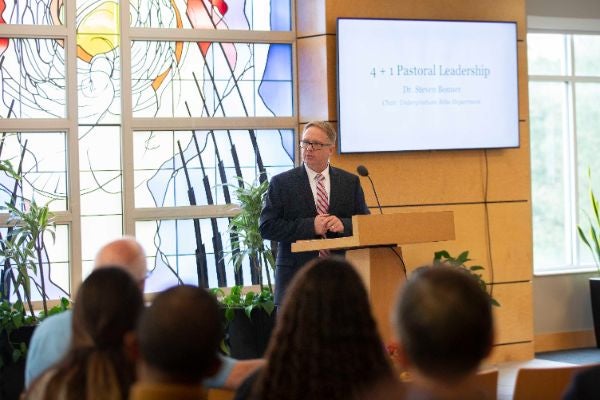
B.A. in Pastoral Leadership & M.A. in Pastoral Studies
Program Overview
In today’s world, effective ministry involves more than just knowledge. The needs of those you serve are often complex and change over time. As a servant-minded, passionate individual eager to meet those needs, you can study at an accelerated pace under devoted scholar-practitioners across a variety of disciplines. They will give you the tools you need to act as a faithful participant for the cause of Christ.
Enter pastoral leadership with more training and experience than a standard ministry program. Through our Bachelor's and Master's degree programs, you will engage in biblical and theological study grounded in Scripture. Additionally, you will gain practical skills for pastoring, such as conflict management, partnering with civic organizations and nonprofits, and functioning within established systems, especially in urban contexts.
Program Outcomes
Partners with The Kern Family Foundation, Lipscomb offers this cost-effective and convenient pathway for you to earn both your bachelor’s and master’s degrees while in residence at Lipscomb University. You will graduate after four years with a bachelor’s in Pastoral Leadership. Then, you will continue your education an additional year to finish the program. Upon completion of this program, you will begin ministry with:
- Bachelor of Arts in Pastoral Leadership
- Master of Arts in Pastoral Studies
Directed Electives
Students in the Pastoral Leadership program have the opportunity to tailor the undergraduate degree to a specific area of interest. The four directed elective paths allow students to be specialized in an additional field by taking the core classes within the area of study. Choose from the following focus areas:
- Business as Mission
- Psychology
- Theology & Ministry
- Youth Ministry
Admissions
Students initially entering this program will follow the standard admissions requirements for all undergraduate programs. This includes an online application, which can be found here, in addition to submitting:
- ACT and SAT test scores
- Qualified reference letter
- Official high school transcript
When you are almost through with the bachelor's degree portion of the program, you will apply for acceptance into the Hazelip School of Theology. This is necessary for the master's degree. Admissions requirements for Hazelip include:
- Application with $50 nonrefundable application fee
- Three letters of recommendation: one from a college or university administrator or professor, one from a professional supervisor/employer and one from a church leader or minister
- Official transcripts emailed to gradadmissions [at] lipscomb.edu (gradadmissions[at]lipscomb[dot]edu) or mailed to Graduate Admissions (One University Park Dr., Nashville, TN 37204)
- Bachelor's degree
- Undergraduate or graduate GPA of at least 2.75
- 750-1,000-word essay discussing the applicant's religious heritage, career goals and how Hazelip School of Theology might contribute to the achievement of those pursuits
Courses
The Pastoral Leadership program requires an interdisciplinary mix of courses to prepare students for ministry. See the accordion below for bachelor's and master's requirements.
Tuition & Aid
Tuition and costs vary based on degree, year and other factors. Linked below are the tuition and fees information pages for both undergraduate and graduate levels:
- Undergraduate
- Graduate
- Tuition is currently $540* per credit hour, however, all graduate students in the Hazelip School of Theology receive a 25% discount, which brings the cost per credit hour to $405 per credit hour. No additional fees other than books and a graduation fee are incurred while in graduate studies. Lipscomb also offers interest-free monthly payment plans depending on the length of each semester.
*Note: The graduate tuition rates may increase annually, effective each summer semester.
Why earn your degree at Lipscomb University?
Our Faculty
Career Paths
Pastoral Leadership
Use newly developed pastoral skills honed in the wisdom of faith, work, and economics to lead tomorrow's churches and engage in civic leadership.
Directors, religious activities and education
Plan, direct, or coordinate programs designed to promote the religious education or activities of a denominational group. May provide counseling and guidance relative to marital, health, financial, and religious problems.
Chaplaincy
Serve others in their seasons of need as a chaplain in a variety of settings, including the military, corporations, hospitals, hospice and universities.









